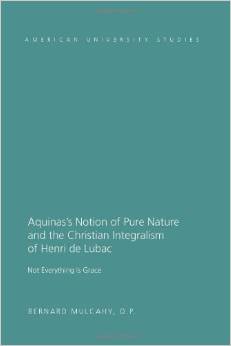Among such recently published texts are:
- The Natural Desire to See God According to St. Thomas and His Interpreters, by Lawrence Feingold. Catholic University of America Press, 2nd. Edition, (October 2004)
- Natura Pura: On the Recovery of Nature in the Doctrine of Grace, by Steven A. Long. Fordham University Press, (April 2010).
- Praeambula Fidei: Thomism And the God of the Philosophers, by Ralph McInerney. Catholic University of America Press. (2006)
- Aquinas's Notion of Pure Nature and the Christian Integralism of Henry de Lubac, by Bernard Mulcahy, O.P. (Peter Lang International Academic Publishers. (April 2011).
- Surnaturel: A Controversy at the Heart of Twentieth-Century Thomistic Thought, edited by Serge-Thomas Bonino. The Catholic University of America Press (July 1, 2007).
I have read and praised McInerney's book elsewhere on this blog -- one of the first of its kind and narrow in scope (focusing specifically on Etienne Gilson and De Lubac's error-ridden interpretation and criticism of Cajetan and Aquinas. My father gifted Feingold's Natural Desire to See God to me on my birthday. Comprehensive in scope and exhaustive in detail, it will likely take several years for me to digest but it is clearly an invaluable resource in this whole debate. Steven A. Long's shorter treatment is on my "to read" list (particularly interesting as it reportedly examines the work of Joseph Ratzinger / Pope Benedict XVI on the topic). Surnatural, likewise on my "to read" list is a collection of various papers pro and con, following a symposium held in 2000 on the controversy of de Lubac's surnaturel.
 Having just completed my reading, I wish to commend Mulcahy's Aquinas's Notion of Pure Nature and the Christian Integralism of Henry de Lubac, the publication of his doctoral thesis under the title "Not Everything is Grace" for the Australian Catholic University (full text of which can be found here). Here is the abstract:
Having just completed my reading, I wish to commend Mulcahy's Aquinas's Notion of Pure Nature and the Christian Integralism of Henry de Lubac, the publication of his doctoral thesis under the title "Not Everything is Grace" for the Australian Catholic University (full text of which can be found here). Here is the abstract:
Henri de Lubac argues that, in early modern times, a pernicious concept began to become commonplace in Roman Catholic theology: this concept is “pure nature.” Pure nature is human nature, considered without reference to grace or to the supernatural destiny of personal union with God. Further, de Lubac argues that Catholic theology, in assimilating this idea, has departed from the sound tradition represented by St Augustine and St Thomas Aquinas. He holds that the notion of pure nature leads inevitably to the self-exclusion of Christianity from the affairs of the world -- when, in fact, the light of the Gospel ought to be shed on all aspects of human existence.Further review by Reinhard Hutter, Duke Divinity School:This dissertation tests de Lubac’s thesis concerning the history of the idea of pure nature, showing that this notion is not, in fact, a modern novelty. This study examines the role of the idea of pure nature in the Bible and early Church, in the theology of Thomas Aquinas, in the early modern Jansenist controversy, in the theology of Henri de Lubac, and in the theology of the contemporary Radical Orthodoxy movement, paying particular attention to the historical circumstances which made the repudiation of “pure nature” attractive.
Today, some theologians follow de Lubac in contending that Catholic doctrine must eschew the idea of pure nature in order to resist secularism and maintain Christianity’s relevance to all aspects of human life. This dissertation contends that the idea of pure nature is not only traditional, but necessary for Christian theology. It argues that a Christian “integralism” which refuses to prescind from grace when considering nature can do justice neither to nature nor to grace.
Characterized by acuity of analysis, fairness of judgment, and lucidity of thought and style, Matthew Bernard Mulcahy’s ‘Not Everything Is Grace’ is an indispensable reading for any serious student of theology with an interest in the recent renewal of the debate over ‘nature and grace’ and especially the idea of a ‘pure nature’.Mulcahy convincingly demonstrates first that theologians of the patristic era were well familiar with a human nature and a common final human discernible apart from revelation and grace and, secondly and more extensively, that the idea, though not the term, of pure nature plays a significant role in the writings of Thomas Aquinas. Furthermore, by showing that Henri de Lubac’s characterizations of Baianism and Jansenism occluded the political and historical contexts and impacts of these theological movements, Mulcahy successfully questions Henri de Lubac’s familiar, but historically unsubstantiated claim, that the modern scholastic use of ‘pure nature’ facilitated the rise of modern secularism and atheism.
Last but not least, Mulcahy offers an accurate and illuminating reading of the most recent radicalization of de Lubac’s vision into a comprehensive theological integralism - Radical Orthodoxy. Mulcahy’s perspicuous analysis of its central tenets constitutes a critique that is as charitable as it is devastating. Mulcahy makes a powerful case for the indispensability of the idea of pure nature for a Catholic theology that wants to account for the full scope of the complexity of creaturely existence. This is a ‘must’ on the reading list for every class that tackles the ‘nature-grace-debate’ in the 20th century. Its clarity and even-handedness make it a welcome contribution to a complicated and often heated debate. Tolle, lege!
